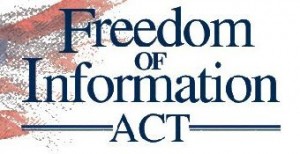Ever want to know what the development down the street will do to the neighborhood? How much traffic it will bring or whether the lights will keep you up all night? But you don’t want to ask at a public hearing because you might be seen as opposing it when all you want is information.
Or maybe you have questions about that new $43 million capital improvement plan that the City Council passed last December? Where was that money going to go exactly? Since you can’t talk at City Council meetings even if you went, there was no opportunity to ask questions unless you are on the agenda.
The federal Freedom of Information Act (FOIA) is the one tool that lets people see exactly what the federal government is doing: whether spending public tax dollars, giving jobs to cronies, or planning new development. Documents that the government keeps are public records.
Each state has its own version of FOIA that applies to and is enforced by the state.
In Massachusetts, the law is called the Public Records Access law. Massachusetts General Law Chapter 4 Section 7 defines public records as everything in every form: paper, electronic files including email, photographs, tapes, and videos. And it includes documents received by anyone in any governmental or political division of the commonwealth—whether city, county, or state officers or employees.
There are 21 exemptions to the rule. Most are intended to protect personal information such as the phone numbers and home addresses of law enforcement officials and judicial personnel or employee medical information. Others protect information on children as determined by a child advocate. But some, such as broad categories on “trade secrets,” may be overused and can be challenged.
Basically, the law states that you are entitled to ask for records, to receive assistance in determining what records are available, and that the records must be produced within ten (10) days. If the cost of production or copying is more than $10.00, you are entitled to a written estimate of the costs.
But here are some pointers on how to navigate the system:
1. Just ask
Any member of the public can ask to see documents. The request does not have to be in writing. It helps, though, to put it in writing so you can verify that the agency complied fully with your request. Nor do you have to tell them why you want to see the documents or provide your identification. Remember, in reality, those are your documents—the public’s documents. Everything that government does is on our behalf.
2. Know where to go
Want to see those development plans? The planning department keeps those records, and you are entitled to see the entire file, not just a set of plans. Often there are other documents that describe environmental, traffic, or other important studies not included on the plans. And the $43 million capital improvement plan? That’s at the office of the chief financial officer.
Generally, records requests aren’t adversarial. You ask to see records, the clerk of the department can either supply them immediately, or may need time to get the entire file. They may ask you to wait or come back. But even a verbal request must be met within ten days, so jot down the date you requested the document.
3. What to ask for
How do you know what to ask for? The trickiest thing in a public records request can be the wording. And if you don’t use the correct term, you may not get what you want. If possible, meet with the record keeper and ask what is available. They are required by law to assist you.
Usually they will explain what is in a file or how the records are kept. It may make it easier to ask for what you need. But if the topic is controversial, or the agency is afraid of being sued, they may not be as helpful. If that’s the case, be prepared to make more than one request.
4. Inspection versus Copies
Copies cost—a lot. The charges can be as high as $.50 per page plus the cost of the person’s time to copy it. Unreasonable since Staples and Office Max cost less than $.10 per page? Yes. But the law allows it. You can choose to inspect the documents and ask for just the copies you need. Or bring a digital camera and take photos of documents.
Also, if the documents are in electronic format, ask to have them sent to you by email and save copying costs. Otherwise you may have to pay for them to be printed out plus the cost of the employee’s time.
5. Stonewalls
Occasionally, you’ll hit a stone wall. The record keeper is paranoid, is afraid for their job, or is simply hiding something. Don’t let it upset you. Put in your request and scrutinize everything you get. Look for what’s there, but also what isn’t there. As an example, a zoning agency did a FOIA request of the U.S. Department of Agriculture on a local mink farm’s license to determine whether it complied with a “right to farm law” (RTFL). The RTFL stated that a federally licensed farm in existence at a location without complaint for three years could not be cited by zoning.
The mink farm had just started up four years before. Many downwind neighbors of the mink farm had complained repeatedly (and bitterly) about the horrendous odors coming from it.
When the copy of the license was received, the zoning agency noticed that the corner had been blanked out by a fold. It could have happened on copying. However, that area of the document listed the location of the mink farm. So the zoning agency asked again to have a full and complete copy of the license.
When it came back, the license area hidden by the “fold” showed that the mink farm was licensed in a different town—and so was not protected by the RTFL.
6. Follow-up, follow-up, follow-up
At each step of the way, follow-up. If they tell you to come back at a certain time, be there. It may be innocuous or it may be they don’t want to produce records. If the records are incomplete, follow-up, but identify the record as having been previously requested and the date it was requested. Then you don’t have to wait an additional ten days.
If you know a record exists, but the record keeper does not provide it, ask for a letter of denial explaining the exemption and the section of law that allows the exemption.
7. Appeals
The Public Records Access process is regulated by Commonwealth of Massachusetts Regulations Title 950 Section 32 (950 CMR 32). If the agency does not comply with your request, you can complain to the Secretary of State’s office, but only if the request was in writing. In the complaint, identify the section of 950 CMR 32 that was non-compliant.
The complaint process will take time—usually a couple weeks—but may be worth it if it appears that you’re not going to get complete records.
Send your letter appealing a denial of documents within ten days, and an appeal for non-compliance of other parts of the regulation within 90 days by mail to:
Supervisor of Public Records Office of the State Secretary
One Ashburton Place, Room 1719
Boston, Massachusetts 02108
Information in this article was not intended to provide legal advice. The author strongly recommends individuals read the statutes and regulations regarding the federal Freedom of Information Act or Massachusetts Public Records Access.
 New Bedford Guide Your Guide to New Bedford and South Coast, MA
New Bedford Guide Your Guide to New Bedford and South Coast, MA









